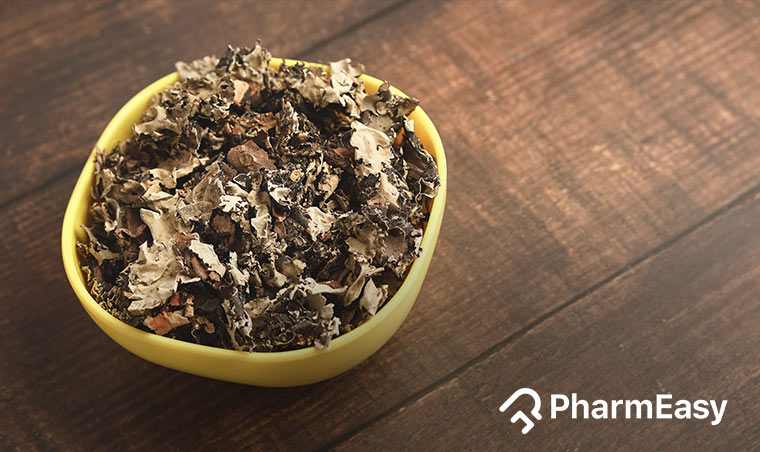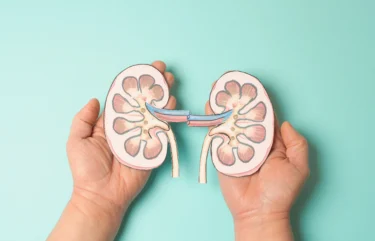Stone Flower (Kalpasi): Uses, Benefits, Side Effects & More!
By Dr Rajeev Singh +2 more

Get,

to manage your symptom
Get your,


4 Cr+ families
benefitted

OTP sent to 9988776655



You’ve successfully subscribed to receive
doctor-approved tips on
Whatsapp

Get ready to feel your best.

Hi There,
Download the PharmEasy App now!!


Register to Avail the Offer
Send OTPBy continuing, you agree with our Privacy Policy and Terms and Conditions

Hi There,
Sign up on PharmEasy now!!
Trusted by 4 crore+ families

OTP sent to 9988776655



You have unlocked 25% off on medicines




Code: NU25
By Dr Rajeev Singh +2 more
Table of Contents
Stone flower, also known as Parmelia perlata, belongs to the family Parmeliaceae. It is a perennial lichen found on dead wood or rocks in the temperate Himalayas1. It is frequently used as a spice for flavouring food items2.

It is also known as

The ethanolic extract of stone flower exhibited significant gastroprotective potential against alcohol, aspirin, cold restraint, and pyloric ligation-induced gastric ulcer in a rat model3. However, this study was conducted on animals, not humans. Therefore, we require more human studies to suggest the benefits of stone flower in managing gastric ulcers.

The aqueous extract of stone flower in a study, when administered to rats, exhibited significant antidiabetic activity. It reduced the haemoglobin A1C (HbA1C level), fasting blood glucose (FBG), increased plasma insulin level and normalised glucose metabolising enzymes’ activity.
It may also considerably improved serum lipid profile by decreasing low-density lipoprotein (LDL), very-low-density lipoprotein (VLDL), cholesterol, serum triglyceride, phospholipids, free fatty acids and possibly increasing high-density lipoprotein (HDL) level3.
The methanolic extract of stone flower also was studied to exhibit significant blood glucose-lowering potential in the oral glucose tolerance test, noteworthy free radical scavenging activity and α-glucosidase inhibitory activity in a rat model3. However, this information is insufficient, and we require large-scale human trials to provide the benefits of stone flower in humans for its anti-diabetic effect. Diabetes is a serious health problem; hence, a proper diagnosis and treatment are needed, thus please consult a qualified doctor for proper advice.

In studies, the ethanolic extract of the stone flower exhibited significant antioxidant potential and a good free radical scavenging effect. In addition, the methanolic extract of the stone flower in a study showed noteworthy antioxidant activity when tested in phosphomolybdenum reduction and 2,2-diphenyl-2-picrylhydrazyl (DPPH) assay3. These claims may need further research to establish their effect on humans.

The methanolic extract of the stone flower was found to have cytotoxic activity and exhibited antiproliferation against colon cancer cell lines in studies3. However these studies were performed on animals and human studies will be needed to understand a similar impact on humans.

The methanolic extract of the stone flower exhibited significant hypolipidaemic activity when tested by an in-vitro anticholesterol assay3. However, these effects need to be ascertained by more research.

The acetone, ethyl acetate, and methanolic extract of the stone flower was studied to have significant antibacterial activity against Staphylococcus aureus. In addition, studies show the hydro-alcoholic extract of the stone flower was found to be significantly active against Pseudomonas aeruginosa, Bacillus cereus, Proteus vulgaris, Escherichia coli, S. aureus, Klebsiella pneumoniae, and Corynebacterium xerosis.
The antibacterial potential of stone flower might be due to the presence of usnic acid3. The methanolic extract of the stone flower also exhibited significant antibacterial activity against some Gram-positive foodborne bacteria. The aqueous-methanolic extract of the stone flower was also effective against P. aeruginosa, B. cereus, E. coli, Bacillus pumilus, S. aureus, Citrobacter freundii, K. pneumonia, and Streptococcus pneumoniae3.

The polysaccharide fraction of the stone flower was investigated for cytotoxicity on cell lines, and it was found to possess specific antiviral potential against the yellow fever virus that attacks the viral envelope3.
Stone flowers might aid in cough. Other than its anti-ulcer and anti-oxidant nature, the Stone flower is believed to have anti-inflammatory and anti-bacterial properties that might keep the cough-causing bacteria at bay.
Dr. Rajeev Singh, BAMS

The aqueous slurry of stone flower exhibited significant hepatoprotective activity when investigated in a rat model3. However these studies are conducted on animals and not much evidence is available for its effect on humans. Please consult a doctor for treatment of liver-related issues and do not self-medicate.

The hydro-alcoholic extract of stone flower exhibited significant antiurolithiatic (reduced formation of crystallizing salts) activity when tested in an in-vitro model3.
Though there are studies that show the potential use of stone flower in various conditions, but these are insufficient and there is a need of further studies to establish the true extent of the benefits of stone flowers on human health.
Use Stone flowers to liven up your relationship with your lover! Stone flower extracts may also be used as an aphrodisiac to improve libido in addition to their other medical uses.
Dr. Siddharth Gupta, B.A.M.S, M.D (Ayu)
Stone flower can be used in the following forms:
You may consult your Ayurvedic physician for the form and dosage. In addition, we advise you to not replace or quit your current medications with any herbal preparations made from cardamom without talking to a physician or an Ayurvedic doctor.
Also Read: Tejpatta (Bay Leaf): Benefits, Side Effects, Nutritional Value & More
There are no major side effects reported with the use of stone flower, but you must consult your doctor if you experience any side effects.
Also Read: Kachnar Uses, Benefits & Nutritional Value
There is not much information available on how stone flower interacts with other medications. Hence, patients should consult a doctor before taking stone flower if they take any other drug or supplement.
Researchers believe that due to its anti-microbial and anti-inflammatory nature, the Stone flower might be helpful in conditions such as conjunctivitis (inflammation of the outer layer of the eyelid).
Dr. Smita Barode, B.A.M.S, M.S.
Also Read: Chandraprabha Vati – Uses, Benefits, Side Effects & Precautions
Stone Flower in Marathi is known as Dagad phool1.
There is no evidence of the effect of its consumption during pregnancy; therefore, you should ask your doctor before consuming it.
Stone flower might be beneficial in the management of yellow fever. Yellow fever is transmitted by mosquitoes and is a tropical viral disease that affects the kidneys and liver, which causes jaundice and fever. Stone flower might be able to inhibit the yellow fever virus primarily because of its antiviral activity3. The data from studies on the effect of stone flowers on humans is insufficient thus it should be taken under the supervision of a doctor.
Stone flower might be helpful in controlling diabetes as it was found to reduce the HbA1C level, FBG, increase insulin level and normalise glucose metabolising enzymes activity3. However, you should consult a doctor for treatment of diabetes and conditions.
Stone flower might be helpful for the management of skin disease as it is mentioned in Ayurvedic Pharmacopoeia of India that it is therapeutically useful in kustha (skin diseases)3. Consult a dermatologist for proper advise.
The smoke of stone flower is helpful in relieving headaches4.
There is no such evidence of the effects of its consumption during pregnancy; therefore, you should ask your doctor before consuming it.
Disclaimer: The information provided here is for educational/awareness purposes only and is not intended to be a substitute for medical treatment by a healthcare professional and should not be relied upon to diagnose or treat any medical condition. The reader should consult a registered medical practitioner to determine the appropriateness of the information and before consuming any medication. PharmEasy does not provide any guarantee or warranty (express or implied) regarding the accuracy, adequacy, completeness, legality, reliability or usefulness of the information; and disclaims any liability arising thereof.
Links and product recommendations in the information provided here are advertisements of third-party products available on the website. PharmEasy does not make any representation on the accuracy or suitability of such products/services. Advertisements do not influence the editorial decisions or content. The information in this blog is subject to change without notice. The authors and administrators reserve the right to modify, add, or remove content without notification. It is your responsibility to review this disclaimer regularly for any changes.
Comments

Leave your comment...
You may also like
Comments